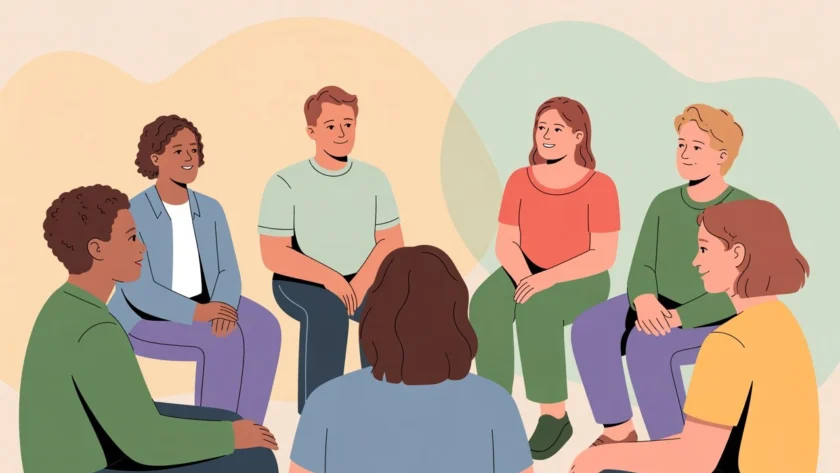I still remember the first time I walked into that church basement for an anxiety support group meeting. My palms were sweaty, my heart was racing, and I’d already turned around twice in the parking lot. The irony wasn’t lost on me—I was anxious about attending a group for anxious people. But something deep inside whispered that I couldn’t keep fighting this battle alone anymore.
That was six years ago, and I can honestly say that decision to push through my fear and walk through those doors changed everything about how I manage my General Anxiety Disorder. If you’re reading this and wondering whether a support group might help you too, let me share what I’ve learned about the incredible power of finding your tribe in the midst of anxiety’s storm.
Understanding the Isolation That Anxiety Creates
Here’s what I wish someone had told me earlier: anxiety is a master at making us feel completely alone. It whispers lies like “Nobody else worries about these things” or “You’re the only one who feels this overwhelmed by everyday life.” General Anxiety Disorder has this sneaky way of convincing us that we’re broken, different, or somehow defective compared to everyone else who seems to navigate life with such ease.
But here’s the beautiful truth I discovered in that basement room—we’re anything but alone. According to the Anxiety and Depression Association of America, over 40 million adults struggle with anxiety disorders. That’s roughly one in five people walking around carrying the same heavy load you’ve been carrying.
The book of Ecclesiastes reminds us that “two are better than one, because they have a good return for their labor” (Ecclesiastes 4:9). This wisdom applies so perfectly to our journey with anxiety. When we’re isolated, our anxious thoughts can spiral unchecked. But when we’re connected with others who truly understand, something powerful happens—we begin to see our struggles through clearer eyes.
What Makes Support Groups Different from Other Treatment Options
Now, I’m not suggesting that support groups replace professional therapy or medication if those are part of your treatment plan. I’ve found that my therapist and my support group work together like a beautiful symphony. My therapist helps me understand the technical aspects of my anxiety and gives me clinical tools, while my support group provides something equally valuable—the lived experience of people who really get it.
There’s something profoundly healing about sitting across from someone who nods knowingly when you describe that 3 AM anxiety spiral. Or hearing someone else articulate exactly what you’ve been feeling but couldn’t quite put into words. In my experience, support groups offer three things that are hard to find elsewhere: validation, normalization, and practical wisdom from the trenches.
The Power of Shared Understanding
I’ll never forget Sarah, a woman in my first support group who described her morning anxiety routine with such precision that I thought she’d been watching me through my bedroom window. She talked about waking up with that familiar knot in her stomach, the way her mind immediately started cataloging everything that could go wrong that day, and how she’d lie there feeling paralyzed by possibilities that might never happen.
For the first time in years, I didn’t feel crazy. I felt understood.
This shared understanding creates what psychologists call “therapeutic universality”—the realization that our struggles are part of the human experience, not evidence of personal failure. When we hear others articulate our own thoughts and feelings, it breaks the spell of isolation that anxiety casts over us.
Different Types of Support Groups for General Anxiety Disorder
Not all support groups are created equal, and finding the right fit might take some exploration. In my journey, I’ve participated in several different types of groups, each offering unique benefits.
Professional-Led Groups
These are typically facilitated by licensed therapists or counselors who guide discussions and provide clinical insights. I found these particularly helpful early in my journey because the facilitator could offer professional perspective when our conversations went in circles or when someone shared particularly challenging struggles.
The structure in these groups often includes educational components about anxiety management techniques, coping strategies, and sometimes homework or exercises to practice between meetings. What I appreciated most was having someone trained to redirect conversations when they became counterproductive or to offer resources when someone was in crisis.
Peer-Led Groups
Some of my most transformative experiences have come from peer-led groups where members take turns facilitating meetings. There’s something beautifully democratic about this approach—no one person is the “expert,” and everyone’s experience carries equal weight.
These groups often feel more intimate and organic. We’d start each meeting with a check-in, share what we’d been struggling with that week, and organically move into discussions about what was working, what wasn’t, and how we could support each other better.
Faith-Based Support Groups
As someone whose faith journey has been intertwined with my anxiety recovery, I’ve found tremendous comfort in Christian anxiety support groups. These spaces allow us to explore how our relationship with God intersects with our mental health struggles without judgment.
We can honestly discuss questions like “Why doesn’t prayer make my anxiety go away?” or “How do I reconcile trusting God with taking anxiety medication?” These are conversations that might feel awkward in secular settings or inappropriate in regular Bible study groups, but they’re essential for those of us trying to integrate our faith with our mental health journey.
In these groups, we can explore scriptures like Philippians 4:6-7 (“Do not be anxious about anything, but in every situation, by prayer and petition, with thanksgiving, present your requests to God”) while also acknowledging that anxiety disorders are real medical conditions that often require multifaceted treatment approaches.
The Tangible Benefits I’ve Experienced from Support Group Participation
Learning Practical Coping Strategies
Some of the most effective anxiety management techniques I use today didn’t come from books or therapists—they came from fellow group members who discovered them through trial and error. Maria taught me her “5-4-3-2-1” grounding technique that pulls me out of panic attacks. David shared his breathing exercise that helps him sleep when his mind won’t stop racing. Jennifer introduced me to anxiety-friendly apps that have become part of my daily routine.
There’s something powerful about learning from people who’ve road-tested these strategies in real life. When someone says, “This breathing technique got me through my daughter’s wedding without a panic attack,” you pay attention in a different way than when you read about breathing techniques in a book.
Accountability Without Judgment
One of the unexpected benefits of my support group has been gentle accountability. When I committed to trying a new coping strategy or working on a particular trigger, I knew I’d be checking in with the group the following week. This wasn’t pressure—it was loving encouragement from people who wanted to see me succeed because they knew how it felt to struggle.
I remember when I was terrified to drive on the highway after having a panic attack behind the wheel. The group helped me create a step-by-step plan to gradually work back up to highway driving, and they celebrated each small victory along the way. Their encouragement gave me courage I couldn’t muster alone.
Breaking the Shame Cycle
Anxiety has a way of making us feel ashamed of our fears, especially when they seem “irrational” to others. In my support group, I could admit to being afraid of grocery shopping or calling to make appointments without seeing eyes roll or receiving well-meaning but unhelpful advice like “just don’t think about it.”
This shame-free environment was crucial for my healing. As Brené Brown often says, “Shame dies when stories are told in trusted spaces.” My support group became that trusted space where I could be completely honest about my struggles without fear of judgment.
Navigating the Challenges of Support Group Dynamics
I’d be dishonest if I painted support groups as perfect solutions without any challenges. Like any gathering of humans, groups can sometimes have difficult dynamics that need to be navigated carefully.
When Groups Become Echo Chambers
Occasionally, I’ve been in groups where the focus became more about sharing anxiety stories than developing coping strategies. While validation is important, there’s a fine line between supportive sharing and what some call “anxiety competitions”—where members unconsciously try to one-up each other with increasingly dramatic stories.
Good group facilitators help prevent this by gently redirecting conversations toward solutions and growth rather than allowing them to spiral into shared catastrophizing. If you find yourself in a group that consistently leaves you feeling more anxious than when you arrived, it might be time to look for a different group or speak with the facilitator about the dynamic.
Dealing with Different Perspectives on Treatment
In mixed groups (secular and religious people together), there can sometimes be tension around different approaches to anxiety treatment. I’ve seen people judge others for taking medication, and I’ve also seen people dismiss prayer or spiritual practices as ineffective.
I’ve learned to stay grounded in what works for me while remaining open to learning from others’ experiences. My faith informs my approach to anxiety management, but I also recognize that God often works through medical professionals, therapy, and yes, sometimes medication too.
Managing Confidentiality and Boundaries
Support groups require a high level of trust, and occasionally that trust can be tested. I’ve been in situations where someone shared something outside the group that should have remained confidential, or where a group member reached out for support between meetings in ways that felt overwhelming.
Most healthy groups establish clear guidelines about confidentiality and contact outside meetings. These boundaries aren’t meant to be unfriendly—they’re protective measures that help the group remain a safe space for everyone.
Finding the Right Support Group for Your Needs
Your first support group experience might not be your last, and that’s perfectly okay. Finding the right group fit sometimes takes experimentation, much like finding the right therapist or the right church.
Questions to Ask Yourself Before Joining
What am I hoping to gain from a support group? Are you looking primarily for emotional support, practical coping strategies, spiritual growth, or a combination? Being clear about your goals can help you choose between different types of groups.
How much structure do I prefer? Some people thrive in highly structured groups with specific topics each week, while others prefer the organic flow of peer-led discussions. Neither approach is better—it’s about finding what works for your personality and needs.
What role does faith play in my anxiety journey? If your relationship with God is central to how you process your struggles, a faith-based group might be essential. If you prefer to keep spiritual and mental health discussions separate, a secular group might feel more comfortable.
Where to Look for Groups
Many churches now host anxiety support groups, often called “Freedom from Fear” or similar names. Mental health centers, hospitals, and community centers frequently offer groups as well. The Anxiety and Depression Association of America maintains a database of support groups searchable by location.
Online groups have become increasingly popular, especially since the pandemic. While they don’t provide the same in-person connection, they can be wonderful options for people in rural areas or those whose anxiety makes leaving home particularly challenging.
Red Flags to Watch For
Be cautious of groups that discourage professional mental health treatment, promise miraculous cures, or create an atmosphere where questioning is discouraged. Healthy groups should complement professional treatment, not replace it.
Also be wary of groups that consistently leave you feeling worse rather than better, or where one person dominates every conversation. Good groups should feel safe, supportive, and focused on growth and healing.
Integrating Support Group Insights with Professional Treatment
One of the most valuable aspects of participating in support groups has been learning how to integrate the insights and strategies I gain with my professional treatment plan. My therapist has actually encouraged my group participation because she sees how it reinforces and expands the work we do together.
I keep a small notebook where I jot down strategies that other group members share, questions that come up during discussions, and insights I want to explore further with my therapist. This practice has helped me maximize the benefits of both forms of support.
The Role of Faith in Community Healing
As believers, we’re called to “carry each other’s burdens” (Galatians 6:2), and I’ve found that support groups are beautiful expressions of this biblical principle. When we share our struggles and support others in theirs, we’re living out the kind of community that God designed us for.
There’s something particularly powerful about praying together with people who understand exactly what you’re praying about. When someone in our group is struggling with a specific anxiety trigger, we can pray with a level of specificity and understanding that general prayer requests often lack.
I’ve also found that serving others in my support group—offering encouragement, sharing resources, or simply listening—has been part of my own healing journey. As Jesus taught us, “it is more blessed to give than to receive” (Acts 20:35), and this truth extends to emotional and spiritual support as well.
The Ongoing Journey of Growth and Connection
Six years later, I’m still part of a support group, though my role has evolved. Sometimes I’m the one needing extra support during particularly challenging seasons. Other times, I’m able to offer encouragement to newer members who remind me so much of myself on that first terrifying night in the church basement.
What I’ve come to understand is that managing General Anxiety Disorder isn’t a destination—it’s a journey. And like most journeys worth taking, it’s better traveled with companions who understand the terrain.
The community I’ve found through support groups has become one of my most valuable resources for maintaining mental health. These people have celebrated my victories, supported me through setbacks, and helped me remember that I’m not defined by my anxiety—I’m simply someone learning to manage it well.
If you’re still sitting in the parking lot, metaphorically speaking, wondering whether a support group might help you too, let me offer you the same gentle encouragement someone once gave me: You don’t have to figure this out alone. There are people waiting to walk alongside you who understand exactly where you are and can help you see the path forward.
Your anxiety doesn’t disqualify you from community—it actually makes you a perfect candidate for the kind of deep, authentic connection that happens when people are brave enough to be vulnerable together. In a world that often feels increasingly disconnected, support groups offer something rare and precious: the chance to be fully known and still completely loved.
The courage it takes to walk through those doors—whether physical or virtual—is the same courage that will carry you through your healing journey. And you don’t have to summon that courage alone. God meets us in our weakness, and often He does it through the loving presence of others who’ve walked this path before us.
Take the first step. Your tribe is waiting.




